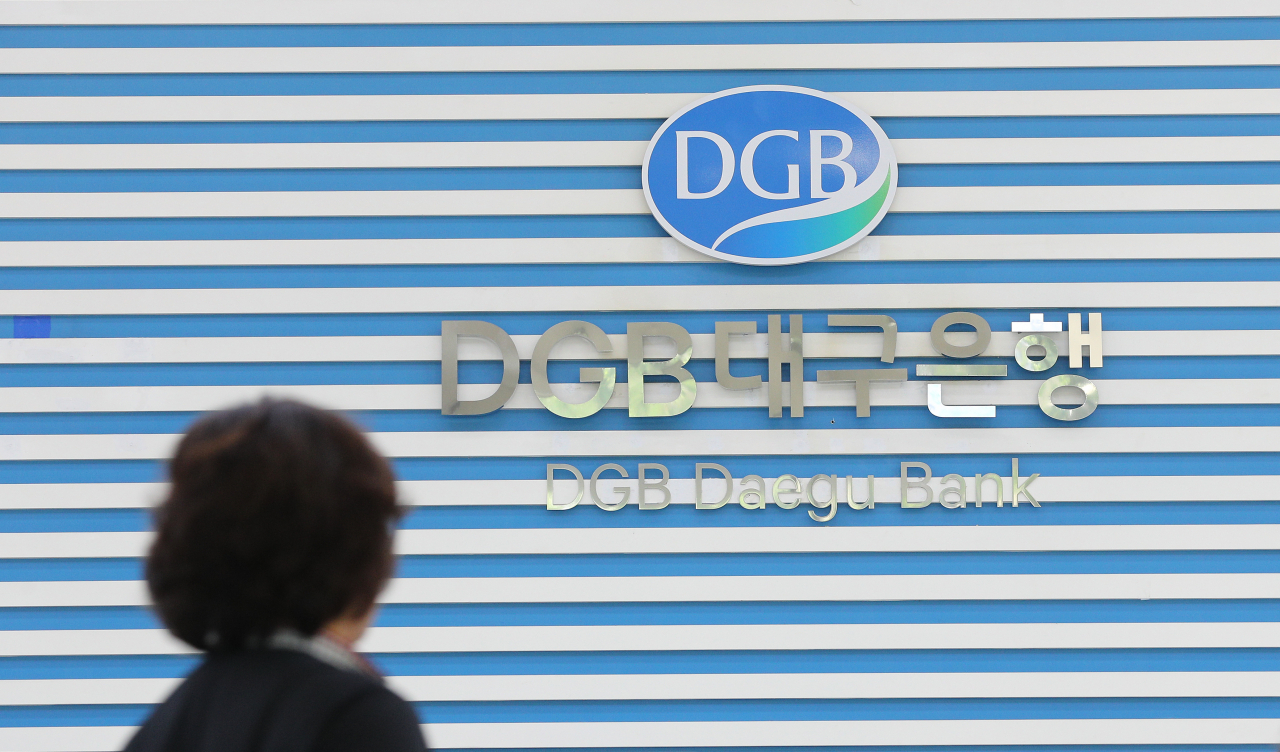 |
A Daegu Bank logo is seen at the headquarters in Daegu, Thursday. (Yonhap) |
South Korea’s financial authorities are seeking to dismantle the banking industry’s long-held oligopoly by lowering the entry barrier for newcomers. But the outlook remains mixed amid the seemingly impregnable dominance of the nation’s five banks.
The Financial Services Commission, Korea’s top financial regulator, said Wednesday that it will allow more banks to break the existing oligopolistic structure of the commercial banking industry, led by the top five banks -- KB Kookmin, Shinhan, Hana, Woori and NongHyup.
As of last year, the five banks account for 63.5 percent of the nation’s loan market and 74.1 percent of the deposit market.
The recent change comes in response to criticism President Yoon Suk Yeol fielded at the banking industry at the beginning of this year.
The president criticized local banks for paying hefty bonuses to their employees at a time when the public was reeling from high loan interest rates. As a solution to lowering the loan rates, he suggested prompting increased competition among financial institutions.
One of the potential players to newly enter the market is Daegu Bank, a regional bank that declared it would become a nationwide commercial bank to compete head-on with existing rivals. The bank is undergoing regulatory review.
If its application gets accepted, it will be the first nationwide commercial bank to be approved since the establishment of Peace Bank -- now Woori Bank -- in 1992, except three internet-only banks approved in a recent digital push.
“If the approval process takes place fast, we expect Daegu Bank will get the license before the end of this year,” FSC Vice Chairman Kim So-young said.
Industry officials showed mixed reactions to the outlook.
“Existing banks will be pressured to make changes on their own. This could lead to a decrease in interest rates, a boon for consumers,” said a banking industry official on condition of anonymity. He stressed that the change would diversify customer options when they choose a bank.
But some saw a limited impact in renewing competition in the market, considering Daegu Bank is a regional bank that mainly operates branches in provincial areas.
“There are doubts about whether local banks, which often have smaller capital compared to nationwide commercial banks, can compete with the top lenders,” said another industry official who also wished to remain unnamed.
“Even internet banks, equipped with innovative services, have not yet toppled the big five’s oligopoly.”
Three internet-only banks -- K Bank, Kakao Bank, and Toss Bank -- have made their highly publicized debuts since 2017. But their combined share in the nation’s deposit and loan markets remains at about 2 percent.
Daegu Bank’s expansion into the metropolitan area is also prompting concerns that small and medium-sized firms in Daegu and the provincial area could get limited access to loans.
FSC Chairman Kim Joo-hyun, however, dismissed the concerns.
“I believe that Daegu Bank will effectively address the issue of capital outflows. Considering the substantial support it gets in the Daegu region, the lender would not overlook its regional customers despite its operational expansion,” Kim said Friday during a press conference marking his first year in office.
Daegu Bank CEO Hwang Byeong-woo also stressed Friday that the bank’s headquarters will remain in Daegu even after it becomes a nationwide commercial bank, saying that a lot of the profits will be used to invest in the local community.
"As we generate profits in the Seoul metropolitan area and increase our capital, we can expand our loan assets. These increased loan assets will naturally have a significant impact in our operations in Daegu and North Gyeongsang Province, where we are deeply rooted,” Hwang added.







![[Today’s K-pop] Blackpink’s Jennie, Lisa invited to Coachella as solo acts](http://res.heraldm.com/phpwas/restmb_idxmake.php?idx=644&simg=/content/image/2024/11/21/20241121050099_0.jpg)